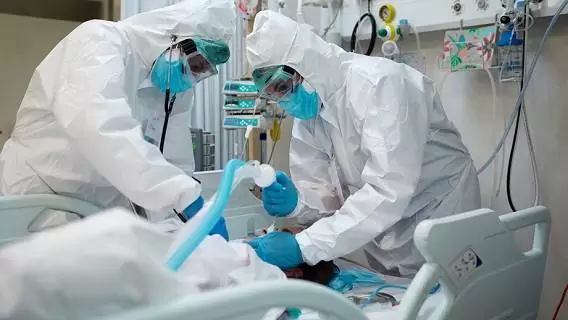
Views: 1
– Severe COVID-19 courses can now be detected at an early stage. Researchers at the University of Zurich have identified the first biomarker that allows reliable predictions. In this way, patients with serious illnesses can receive the best care possible.
Courtesy UZH: The majority of people who are infected with SARS-CoV-2 do not become ill or become seriously ill. Some of the patients with COVID-19, develop a very serious life-threatening disease. They need intensive medical care and artificial ventilation. For those affected, the infection is often fatal or has significant long-term health consequences. In order to recognize these patients at an early stage and treat them quickly, measurable indicators are needed: predictive biomarkers that can be used to predict the risk of a severe stroke.
Biomarkers for serious COVID-19 courses discovered for the first time
The team led by Burkhard Becher, a professor at the Institute for Experimental Immunology at the University of Zurich, discovered this biomarker together with researchers from Tübingen, Toulouse and Nantes: the number of natural killer T cells in the blood. They are a class of white blood cells and part of the initial immune system. “Based on the number of killer T cells in the blood, a severe course of COVID-19 can be predicted with a high degree of certainty – and that already on the day of admission to the hospital,” says Becher.
More targeted therapy thanks to more accurate immunopathogenesis
The new evidence test helps to decide which organizational and therapeutic measures should be taken in a patient with COVID-19, such as transfer to intensive care or normal ward, frequency of oxygen saturation measurements, therapy and initiation of treatment. “For such considerations, predictive biomarkers are very useful. They help to provide the best possible care for patients with serious illnesses, ”says Stefanie Kreutmair. The results also allow researching new therapies against COVID-19, according to the study’s lead author.
Progress thanks to high technology
The cause of rapid deterioration in patients with COVID-19 is an excessive immune response. “The enormous production of messenger substances, known as the cytokine storm, causes a massive inflammatory reaction in the body. The immune cells migrate en masse to the lungs, where they interrupt gas exchange ”, explains Becher. The UZH researchers used high-dimensional cytometry to determine immune cells and cytokines in patient samples. This means that proteins on the surface and within millions of cells can be determined simultaneously and at the level of the individual cell and then processed by computer algorithms.
Specific immunological signature for decoded SARS-CoV-2
In addition to SARS-CoV-2, several other pathogens can cause pneumonia – and therefore an immune reaction. Those of patients with COVID-19 have been extensively investigated, but so far it is unclear what exactly characterizes the specific immune response to SARS-CoV-2. To determine this, the researchers also analyzed blood samples from patients with severe pneumonia, which was triggered by pathogens other than the new coronavirus, for comparison. The comparison of the immune response of patients with COVID-19 with that of the comparison group allowed us to identify what is unique about the immune response to SARS-CoV-2.
“The immune responses in the various types of pneumonia are very similar and are part of a general inflammatory response that is usually seen in patients in intensive care units. However, T cells and natural killer cells behave uniquely in the case of COVID-19 and define a kind of pattern in the immune system: the specific immunological signature of COVID-19 ”, explains Becher.
Financing: The study was funded by the Swiss National Science Foundation (SNSF), the translational research center The LOOP Zurich and the Vontobel Foundation.
Related article: Detection of COVID antibodies in 10 seconds